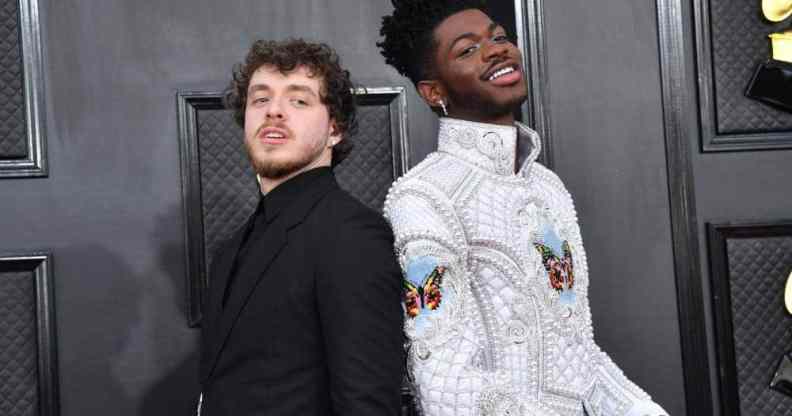Jack Harlow slams ‘totally inappropriate’ homophobic reaction to ‘hero’ Lil Nas X

Jack Harlow says there is still much “progress to be made” in the music industry and society given the “totally inappropriate reaction” to Lil Nas X. (Angela Weiss/AFP via Getty)
Jack Harlow has called out the “totally inappropriate reaction” to Lil Nas X’s work and identity, saying there’s “still some homophobia going on”.
Harlow, who collaborated with Nas for his hit “Industry Baby”, described the iconic gay rapper as a boundary pusher and a “hero” in an interview with the Guardian.
He said that some of the reaction to Nas and his work showed there’s still a lot of work to be done to eradicate homophobia within the music industry and society.
“The totally inappropriate reaction to him lets you know that we still have some progress to be made,” Harlow said, referring to Nas’ sexuality. “And you hear it in passing; there’s still some homophobia going on.”
He continued: “But he’s taking the hit that artists won’t have to take in the future. That’s what makes him a hero.”
Harlow told British GQ back in October that he was “attracted” to Lil Nas X “as an artist” because “he’s at the front and centre” of the drive for inclusion in the music industry.
He acknowledged in his previous interview that there’s still a “long way to go” as there are still people that “will always feel like you are forcing” being LGBTQ+ “down their throats”.
Harlow added that he even had “people in my corner” telling him not to work on a song with Lil Nas X.
“But I just realise there is a fundamental difference with how the world is seen by some people,” he said. “Some people think certain things are wrong.”
He continued: “There are some people, at the root level – although they don’t want to hurt any gays; they don’t hate gays – they think it is wrong, whether it’s religion or whatever reason it is.
“But for me, I have never been this way. Never.”
Earlier this year, Lil Nas X slammed the music industry for ‘sanitising’ LGBTQ+ musicians by telling them to “be gay without being gay”.
The “Sun Goes Down” rapper told CBS that he wanted more LGBTQ+ artists to feel free to be themselves without fear of being shamed or judged. He said he’s “definitely more out there” than other out LGBTQ+ artists and described how there was pressure within the music industry to conform.
“It’s always been, ‘OK, if you’re gay, this needs to be sanitised. Let’s not include anything sexual,’” he said.
“It’s like, ‘Be gay without being gay. We don’t wanna know what happens behind closed doors, or we don’t want you to express that’.”

